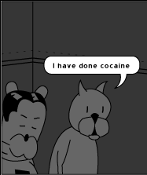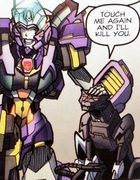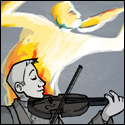|
Holy poo poo, I pop into the chat thread and we're really having a discussion about objectively winning vs. fun and the merits of storygaming. This hyphz dude is a few Marxism references away from being Tarnowski. All of this has happened before and all of it will happen again...
|
|
|
|

|
| # ? Jun 12, 2024 00:00 |
|
hyphz posted:I mean, it’s good to reward good ideas, right? But how do the players know they have been rewarded?[...]It doesn’t matter, and if it doesn’t matter then there’s no perceivable reward. I can’t reward the players for their good ideas with a cookie if I can’t show they wouldn’t have gotten the cookie anyway. Blades is a particularly weird example for this problem because when the player proposes their action the GM can straight up say that will have greater or lesser effect. You’re encouraged to talk about how different actions or approaches will influence the position and effect before the roll. The player knows there’s a reward given for a better idea because you tell them so, and if they make the roll there are more ticks going on the clock than there would have been.
|
|
|
|
hyphz posted:But if I'm just making stuff up and doing that ticks a clock then maybe just paying them would have ticked the clock too. Or maybe if they'd just walked around randomly at the docks they'd have met someone that would have resulted in a tick. Or heck if they'd just murderhoboed the local bar maybe someone would have dropped a note. It doesn't matter, and if it doesn't matter then there's no perceivable reward. I can't reward the players for their good ideas with a cookie if I can't show they wouldn't have gotten the cookie anyway. Not only is this example false for the reasons ironicus mentions, but.. "paying people off for information" and "murdering a bar full of people for information" are *radically* different outcomes, even if they both involve you getting information.
|
|
|
|
hyphz posted:Well, ok, the problem is that in order to give an example I’m having to oversimplify things. Say the PCs want to get some poison on the sly, so they investigate a local gang leader and find he’s in trouble with someone else, and so they approach him saying that if he’ll provide the poison to them, some of it will end up down the other guy’s throat with no tracing back. So you really didn't read any of the books that I asked you about. Because this is addressed in those. Also you totally dodged my direct question which sure is a thing. I restate what is the difference between something from a module, something a GM prepped and what they made up on the spot in terms of category not your bullshit weasel word. They're all equally made up. Is it time that makes it valuable? What?
|
|
|
|
So did we skip the part where Hyphz pretends to not understand that the fictional world described in the game has no existence outside the imaginations of the players and GM? Because that's usually before the bit where his fun has been stolen if every single thing in the entire fictional world wasn't written down long enough ago.
|
|
|
|
Jimbozig posted:The clocks are just HP bars, and your players don't complain about HP bars. There are ways to use player skill and character competencies to do better at filling those clocks, in an objective, rules-defined way. Just like there are ways to use player skill and character powers to do better at combat in D&D. ... I nearly had to rub my eyes to make sure I wasn’t hallucinating the author of this post!  You can “do better at filling the clock” by hitting a high effect level, but the effect level is a GM Fiat choice as is the number of segments on the clock. Yes, the GM can try to pick effect levels sensibly. But I can’t see any way of doing that giving as much of a feeling of “mattering” as beating that monster who was challenging because he had 6+lvl HP but also Resist 2 which we know is challenging because the expert mathematician who determined the monster rules said it was, and you won because the Controller was able to position the monster just right for a Wind Up Strike. The players can see the numbers; they have been objectively verified; they can tell what would have happened had they not used that tactic. Again, maybe there is a way I don’t know (please, please just tell me) or maybe it isn’t necessary. It wasn’t necessary for CFA because it’s “how are you going to mess with a village festival? What cool or funny stuff will you come up with?” While Spire is “how are you going to help free your people from hundreds of years of oppression? In the name of God, HOW?”
|
|
|
|
Why on earth is HP more 'objective' than ... god, really, anything at all? HP is the most abstract thing in the universe, a literal number for 'how far are you, a complicated biological and spiritual entity in this fantasy world, from dying.' Having a stress track with however many points on it is always the same degree of 'objective' - it was always invented by somebody. HP or Spire Resistances, they're the same. As for Spire... steal the Heart progression system or don't, but in either case, there's clear mechanical rules for: Pissing off NPCs, building alliances, getting hurt, doing all sorts of poo poo. Don't think of spiking a water supply as a single monster's HP, that's ridiculous. Think of it as the end of the dungeon, after however many goblins/aelfir security experts and gangs and embargos on drugs and filters and so on are between here and there. That number of goblins is completely arbitrary, in most D&D editions (I suppose if you're running 4e with the corrected math there might be something like actual math involved?). Further, you can absolutely see what would have happened if you used different tactics, when you understand 'change to the setting' as the end of the dungeon, not the individual monsters. Individual monsters are 'the local gang we need to suborn' and 'the customs officer who's going to come down on us if we don't bribe, blackmail, or murder them.' If you bribe a customs officer, you take a big hit to Silver resistance this one time (and again every time, maybe tell them that 'every week in-game you'll need to pay them off again') while if you kill them, next session the guards will come poking around looking for the murderer. If you choose to talk someone into something, now you have a connection to them... but if you betray them or their interests, they know who you are and they won't be sweet-talked again. Every decision a character makes in this milieu is more meaningful than the decision between two doors. It shapes the entire game going forward, in large or small ways, and you the GM now have an extra tool on hand. Maybe they make an enemy, and you can have them come back again later at the climax! Sure, it's not going to change that they have some kind of thing to fight at the climax, but it's going to change what that fight is completely. WHAT players do is far more meaningful than that they did SOMETHING, unspecifically, which seems to be an issue for you? You seem to think that these games are about checking the 'dungeon cleared' box, and it's true, you won't have a box like that to check in Spire. Instead, you'll have many boxes to check, and some will go UNchecked, entirely. If you want choice like that, give them trade-offs: "If you focus on poisoning the water supply, you'll succeed at causing a huge disruption but the Aelfir will crack down brutally on the lower Spire and many drow will also be poisoned. You'll cause chaos, but you'll have a huge bounty on your heads and many of your allies will want you dead because their loved ones drank death." You can give them that choice up front, no need to show them later! E: This is a very long way of saying, the question in Spire isn't "How will you end oppression" because the answer is "You almost certainly won't, or if you do, it'll be the end result of a whole host of events and it won't be predictable to anyone, even the GM." The actual question is "How will you fight powers that be and what will you suffer in the name of resistance?" It's "How do you spit in the face of a system you can't expect to beat" and "What kind of heists and adventures can you pull off?" And maybe an individual game asks specifically 'How do you kill this one Aelfir demonologist who plans to enact a terrible ritual?' or 'How do you attempt to undermine the Aelfir faculty at the university and promote free Drow theology?' You don't ask the question in D&D 'how do you solve all dungeons forever?' you ask 'how do you make it through this one dungeon?' Joe Slowboat fucked around with this message at 06:41 on Apr 17, 2020 |
|
|
|
hyphz posted:... I nearly had to rub my eyes to make sure I wasn’t hallucinating the author of this post! So yeah, Strike! And D&D have complicated combat systems, while the way you interact with clocks in BitD and etc. is really rudimentary, like combat in old school D&D without mages or backstabbing or any of that stuff. You attack, you roll to see how your attack did. Maybe you position yourself to get flanking or something to give a bonus to your attack. But it's still the same thing! I get that you want more, but it's just not there. The game that does for conflicts generally what tactical minis games do for combat does not currently exist. If I had any idea how to make a general conflict system as complex and interactive as Strike! combat without it falling into meaningless abstraction, I'd have done it! Team Conflict was the best I could do in 2014 and it's obviously inferior to the tactical combat in Strike! I can't even figure out how to do it well for more limited things like social conflict. I could go on all day about the issues with social conflict systems. (Luke Crane's latest weird project about France has a really compelling take on social abilities). I can sort of do it for journeys, since concepts like physical positioning and maps are solid and concrete - I haven't published my work on journeys, but I've been fiddling with it since I finished the Survival mini-expansion. It seems like a designer should be able to make some headway with heists, but I haven't dipped my toe there yet.
|
|
|
|
I will say that the Chronicles of Darkness and Exalted 3e social maneuvering systems do their particular genre paradigms of social influence quite well, though obviously they still involve writing up NPCs with specific motivations and qualities that make up the social milieu you're operating in.
|
|
|
|
One thing to ponder on Hyphz is that all of these games are abstractions at different levels against the fictional 'reality' of what's happening. There's no fundamental reason why 'poison the city's water' needs to be a drawn out process of multiple rolls vs a single check - it's entirely down to the GM and players consensus as to what's acceptable. Where the balance between GM and players sits is driven partially by the system but also by negotiation and taste. If poisoning the city's water is clearly what your players are excited and interested in doing, then it's clearly more satisfying to detail it and make it a multi-stage challenge and focus on the various bits of the process. If not, then zooming it out and having it be a single roll can be equally workable at the table! For example when playing 4e and running older adventures in it, we were dissatisfied with smaller encounters so ended up resolving them through a single roll - we'd nominate someone to 'lead the battle', they'd make an attack check, and the fight would be over, costing surges if they 'missed'.
|
|
|
|
Joe Slowboat posted:
This reminded me of Hyphz' post from a little while back hyphz posted:It's not as contained about that. We do have a "master tactician" in the group. He doesn't hector anyone, but people do generally do what he suggests because his tactics are so sound. They do that for a while, but then they nope out of the game completely because it's just following instructions. A perfect example - someone who's making people quit playing because they're too 'good', and therefore they're actually not a great player because they make the game worse.
|
|
|
|
hyphz posted:But how do the players know they have been rewarded? If both routes are predocumented then I can show the players that, and if they can talk to other players online who did pay the guy they can learn that what they did was to their advantage. hyphz posted:... I nearly had to rub my eyes to make sure I wasn’t hallucinating the author of this post! hyphz posted:The players can see the numbers; they have been objectively verified; they can tell what would have happened had they not used that tactic. Splicer fucked around with this message at 10:09 on Apr 17, 2020 |
|
|
|
I don't think hyphz needs to be banned from the chat thread, but I do think that everybody should just put hyphz on ignore if this exact same derail is going to happen every other week in the exact same way, just because you can have the same dumb argument over and over doesn't mean you have to.
|
|
|
|
I dunno, I think it's really interesting even if I don't at all agree with Hyphz. Unless someone has something more interesting to talk about then I don't think it's a problem.
|
|
|
|
Hyphz definitely isn't an idiot or anything, but he's definitely got an almost alien perspective on how RPG's work
|
|
|
|
Kai Tave posted:I don't think hyphz needs to be banned from the chat thread, but I do think that everybody should just put hyphz on ignore if this exact same derail is going to happen every other week in the exact same way, just because you can have the same dumb argument over and over doesn't mean you have to.
|
|
|
|
I always mean to reply to hyphz but my brain starts to hurt before I can formulate anything
|
|
|
|
Personally I know a few people who react to rpgs in much the same way hyphz does, and this is a fascinating look at those thought patterns.
|
|
|
|
Leraika posted:Personally I know a few people who react to rpgs in much the same way hyphz does, and this is a fascinating look at those thought patterns. And he always seems to take the semi-dogpile and accusations of being a weirdo in (fairly) good humour.
|
|
|
|
I really appreciate how Hyphz keeps sticking with it and asking questions in good faith, trying to understand what he doesn't understand, even as people on all sides give him a hard time. It can be so easy to just give up and assume that people disagree with you out of spite, and that is what makes someone a grognard, not any beliefs about the proper way to elfgame.
|
|
|
|
Splicer posted:I thought you mainly played D&D/Pathfinder. If you can suspend disbelief this hard already how is this an issue? He's talking about me. And he's talking about how even if clocks are objective, it doesn't exactly feel like your choices matter because sneaking past the guard and gassing the guard with ether have the same mechanical effect (some segments come off the clock). Which is true, unless the GM determines that one has a stronger base effect, which is naturally no longer objective. So it's like playing D&D combat where you have exactly one power and the choices you make are just to reskin it in different ways, and the GM might give an edge to certain reskins or a penalty to others. So the only way your choices matter is a non-objective one. And this is in response to me asking why clocks don't solve the problem of creating an objective challenge like HP does in combat. And I think it's a reasonable response. Insofar as it's objective, choices don't matter only dice, and insofar as choices matter, it's not really objective. Jimbozig fucked around with this message at 14:36 on Apr 17, 2020 |
|
|
|
Abyssal Squid posted:I really appreciate how Hyphz keeps sticking with it and asking questions in good faith, trying to understand what he doesn't understand, even as people on all sides give him a hard time. It can be so easy to just give up and assume that people disagree with you out of spite, and that is what makes someone a grognard, not any beliefs about the proper way to elfgame. Well said
|
|
|
|
This whole conversation has been interesting to me because it mirrors my loss of interest in tabletop RPGs focused on overcoming challenges. The challenges thrown in the players' path, and the things you must do to overcome them, are all equally arbitrary. At some point I got old and tired and lost interest in dealing with other peoples' made-up problems. If you're focused on RPGs as a process of working as a team to overcome a challenge, and you want to be able to compare your ability to overcome challenges with other gaming groups, then you need to fall back on some pre-created material that can be shared and used by multiple groups. It might be interesting to come at this from a different angle and ask, "What is good tabletop RPG play?"
|
|
|
|
I would argue that if you're obsessed with overcoming "objective" challenges you should just be playing boardgames or video games instead of roleplaying games.
|
|
|
|
I'm really sure this doesn't happen every two weeks. Heck, this time started with me running a game I hadn't run before, really liked, and that went well, so if that could happen every two weeks I'd be a much happier guy.  Splicer posted:By everyone involved being on board and capable of basic social interactions. Will it be exactly the same feeling? Of course not, they're different activities. The same way winning once upon a time feels different to winning wingspan. They're equal feelings of accomplishment and equal levels of fun along the way, but different. I also know people who don't like once upon a time or don't like wingspan type games. And some days I'm not in the mood for one or the other despite liking both a lot! Sorry, the "in the name of God, HOW?" was meant to be in-character, not a thing between players. It's a classic start to many adventure stories and especially movies where you know the hero's going to win. But, in the name of God, HOW is he/she going to break into this fortress? In the name of God, HOW is he/she going to defeat the battle station? When the fiction answers that well, you get James Bond or Luke in Ep4. When it answers it badly, you get Charlie's Angels or Anakin in Ep1. That's basically what I'm stuck on - how within improvisation you can make sure that the answer has that correct feeling. It seems like it'd be easier because you can use the same techniques those movies used. But it's not, because it's much easier to suspend disbelief about how difficult or skillful it is for James Bond to have worked out what to do, than it is to know exactly how your character worked out what to do because it was actually you who did the working out. And the problem is that having good ideas doesn't necessarily reflect that. I have read enough Play Unsafe to have read that the best ideas tend to be ones that were obvious to the person suggesting them, but not anyone else; when people actively try to make "creative ideas" they tend to go wild and bizarre. But who wants to feel that their character triumphed against massive odds by doing something obvious? Or is it really the case that folks who play these games have such strong IC/OOC barriers that they can genuinely feel differently about their character's hypothetical decision making than their own which actually happened? Tactical combat, as jimbozig mentioned, gets around this. I'm not particularly wedded to D&D/Pathfinder (although there was an.. unfortunate incident in the group with regard to Strike!) Even though HP are "just another clock", the amount they go down isn't fiat, it's in the book. If you can get tactically positioned to do your Daily power that does 6d6+10 instead of your basic attack that does 1d6 then you can immediately say that you were rewarded, that the reward was objective, and that you can immediately see what would have happened had you not done the tactical positioning. And that's the big question, if there's a way to actually get that feeling in more abstract systems where that feeling of "In the name of god HOW?" is important (which is Spire but not CFA) or if it's just not necessary and I'm not sure about that.
|
|
|
|
Xiahou Dun posted:So you really didn't read any of the books that I asked you about. Because this is addressed in those. I haven't read the books yet but I do intend to read through WTF when work and prep for the weekend lets off me. Game 1a. I write down a random number 1-10 on a piece of paper and tell you to guess it. When you guess it I show you the piece of paper and if you got it right you win, else you lose. Game 1b. I tell you to guess a number. Whatever you say, I decide at random if you're going to win and then either say the same number as you, or a random other number. Because I am not playing adversarially, I actually choose to match your number more often than 10% of the time. You win game 1b more often than 1a. And arguably your choice of number in 1a doesn't matter because it should be a 10% chance no matter what (although of course it isn't because human RNG isn't perfect). Yet nobody would say, that these games are interchangable, and that running 1b when I claim to be running 1a would be 100% OK. Game 2a. We are playing Pathfinder 2e. An enemy has an AC of 30. You roll a d20 and your result comes to 29. You missed. But, you are also flanking the enemy, so it gets -2 AC. You hit. You immediately know you were rewarded for using the flanking tactic. Game 2b. You roll a d20 and your result comes to 29. The enemy has no defined AC, so I just decide at the time if you hit or not. Again, I am not playing adversarially so I tend to say that you do hit. Sometimes you flank the enemy which gives a +2 to your roll, but since the enemy has no defined AC, this has no meaning and you can never know for sure if it affects my decision; and even if I say it does, you have no objective proof that it made the difference as you did in 2a. 2b and 2a are not interchangable.
|
|
|
|
Hyphz I described why that framework is already inaccurate in regards to Spire. But also, it’s inaccurate in regards to Star Wars? “How will they defeat the Death Star” isn’t the central plot question of A New Hope, it’s the plot question that emerges after an entire list of other events when the Death Star begins to threaten the rebel base. The key questions in A New Hope at the beginning are ‘What is the secret that rebels died to protect,’ ‘what in the heck is a Jedi,’ and ‘Will Luke get to have an adventure?’ Shortly followed by ‘what’s Luke going to do now that his family are dead’ and ‘can they rescue Leia?’ The plot isn’t just ‘so did they overcome the last big hurdle in the climax’ but an elaborate web of elements that build up to that and give it meaning. Star Wars would have none of its power if the movie skipped all of that straight to the Death Star dogfight. Also, at no point is ‘How will they beat the Empire? For the love of god, How!?’ the key question in New Hope, or even really in any of the Original Trilogy. They ultimately beat the Emperor, but that emerges from the plot thread about Luke becoming a true Jedi - the story is about his personal growth and relationship with Vader, the Empire being defeated is the backdrop and larger context. As for that sense of achievement, I have gotten far more of that from coming up with a clever idea that created an interesting plot with complications than I ever have from rolling a critical hit or dealing slightly more damage. Not just despite but because the way I know it was clever isn’t ‘numbers big’ but ‘the group of people I was with were impressed and thought it was a great idea.’ E: Hyphz I’m pretty sure WTF is significantly less valuable to this discussion than actually reading Spire thoroughly, though I would derive far more enjoyment from you attempting to really understand WTF. Also, your examples are still all really dull even when they’re the version you clearly want us to like more. I don’t fundamentally derive more joy from achieving a correct die roll than not unless the story conditions and the game up to that point give that die roll meaning, and if that’s true I genuinely don’t care what the odds were. There’s a bit of fun to rolling a wildly unlikely success but it’s the fun of gambling, not the fun of RPGs. Tactical elements in games are really not about whether the die roll was improved or not, that’s actually the least interesting kind of tactics (as opposed to, say, 4e’s marks and movement control and various things that are riders on or not reliant on dice rolls). And I don’t usually play TTRPGs for tactics. Joe Slowboat fucked around with this message at 16:44 on Apr 17, 2020 |
|
|
|
Yeah honestly WTF is barely playable if you're a hardcore Jenna Moran fan who's read all of her other books
|
|
|
|
Joe Slowboat posted:E: Hyphz I’m pretty sure WTF is significantly less valuable to this discussion than actually reading Spire thoroughly, though I would derive far more enjoyment from you attempting to really understand WTF. I didn't reread all of Spire - that's another project (not an F&F) - but I did look again at the Running the Game section but it has a lot of the problems of many such sections. First of all it has the "Say Yes" advice, which I understand the spirit of; but taken literally it is lethal to any narrative weight, and if not taken literally gives no help with that issue. Here's the section on Subversion: quote:As the GM, it’s your duty to present items, structures, organisations and people that can be subverted; to provide weak links when the players look for them, to offer them weapons that they can turn against their oppressors. But does it really give the correct feeling, to just look for a weak link in an organization and immediately find one? What a bunch of pillocks that organization must be! Now, I'm sure that statement isn't meant to be taken that literally, which is fine. But there is no guidance on how to make this be, or feel, difficult. I would far rather be told to provide weak links when the players earn them, and know how they do so. quote:Find multiple problems for the characters to tackle at once; have them pulled in many different directions, and have there be no right answer. Have a villain flee and leave an ally injured and bleeding out on the street, and push them into splitting the party or making a difficult choice. This seems to be the popular PbtA method of doing narrative weight - not to provide difficulty in the characters making the right choice, but to make no choice right. I can see the idea of creating narrative drama there, but many players I've talked to say they'd find that profoundly frustrating; that they can't get a clear win no matter what they do. And again, Luke one-shotting the Death Star isn't made to work by the fact he comes back with a fried R2 unit.
|
|
|
|
Neopie posted:Yeah honestly WTF is barely playable if you're a hardcore Jenna Moran fan who's read all of her other books Shhhh don’t spoil my fun Also, Hyphz, maybe respond even a little to the contention that tactical decisions/do you beat them/which door decisions aren’t actually the kind of decisions most indie games and most narratives primarily care about?
|
|
|
|
hyphz posted:This seems to be the popular PbtA method of doing narrative weight - not to provide difficulty in the characters making the right choice, but to make no choice right. I can see the idea of creating narrative drama there, but many players I've talked to say they'd find that profoundly frustrating; that they can't get a clear win no matter what they do. And again, Luke one-shotting the Death Star isn't made to work by the fact he comes back with a fried R2 unit. okay, but, like... why are you trying to win roleplaying game?
|
|
|
|
Abyssal Squid posted:I really appreciate how Hyphz keeps sticking with it and asking questions in good faith, trying to understand what he doesn't understand, even as people on all sides give him a hard time. It can be so easy to just give up and assume that people disagree with you out of spite, and that is what makes someone a grognard, not any beliefs about the proper way to elfgame. Yeah, but given how this cycle seems to repeat itself so often, I wonder if trying to talk through it really accomplishes much. Especially for the types of narrative focused games under discussion, playing with an experienced party for a couple sessions would answer a lot of it.
|
|
|
|
hyphz posted:This seems to be the popular PbtA method of doing narrative weight - not to provide difficulty in the characters making the right choice, but to make no choice right. I can see the idea of creating narrative drama there, but many players I've talked to say they'd find that profoundly frustrating; that they can't get a clear win no matter what they do. And again, Luke one-shotting the Death Star isn't made to work by the fact he comes back with a fried R2 unit. Except there are lots of scenes where they do Succeed At A Cost or otherwise fail forward, like when they escape through a vent and end up in the trash compactor, or Leia frees Han from his carbonite prison and gets captured by Jabba in his stead. And the climax of Empire Strikes Back resolves with Luke losing decisively but temporarily. Clean Success and Success At A Cost can (and almost always do) coexist in the same system, not every roll has to or will make the PCs worse off in some way.
|
|
|
|
hey is there a rules-light or story games thread around here somewhere?
|
|
|
|
Magnusth posted:okay, but, like... why are you trying to win roleplaying game? I've seen this a couple of times, and I legitimately think it's because the word "game" is involved. I knew a guy in college, specifically, who was a pretty reasonable, pleasant human being normally. Not without his foibles, but not a screaming rear end in a top hat, y'know? You could have a discussion with him about pretty contentious subjects and if nothing else, at least amiably agree to disagree. Except when it came to games. Uno, Street Fighter, D&D, didn't matter. As soon as things were attached to the framework of a game, he had to be the one who did the things best, and preferably in a solitary fashion. Like, guy would get pissed off if he wasn't the one to trigger cutscenes in Halo co-op. His tabletop characters were inevitably gothy loners with tortured pasts we never found out, and trenchcoats and katanas whenever the setting allowed. There was one way to play, and that was to be the only one who got rewarded at the end of a session, whether that meant stealing all the reward money (because he made sure he was the only one who was allowed to accomplish things, which must be accomplished perfectly or not at all) or killing the other PCs so they didn't get XP/karma/whatever. I can only assume there's a small but significant group of people out there who mentally attach "zero sum" to the word "game" whenever they hear it.
|
|
|
|
TheAardvark posted:hey is there a rules-light or story games thread around here somewhere? Nope. Historically, the popular ones tended to get their own threads for a while, while all the rest combined didn't have enough player-base to sustain a thread. Might be different these days, though, if someone feels like making a good OP 
|
|
|
|
I'm kind of wondering if there doesn't need to be a separate thread for whatever you want to call this particular kind of regular hyphz-inspired derail.
|
|
|
|
hyphz posted:But does it really give the correct feeling, to just look for a weak link in an organization and immediately find one? What a bunch of pillocks that organization must be! I don't know if you've ever encountered an organisation in real life, but I can assure you 'look for a weak link and you'll find one' is not only narratively convenient, it's entirely true to life.
|
|
|
|
Magnusth posted:okay, but, like... why are you trying to win roleplaying game? It's not about "winning the game", it's about a pleasing narrative. We are pleased when James Bond successfully infiltrates the base. The decisions he makes as he does so appear to us to be non-obvious and interesting, and to govern his success. That means that we feel that he has accomplished something difficult. At the same time, he does not usually come back having risked selling out MI5, with two broken legs and a serious laser burn in the groin area. That means that we feel that he has accomplished the difficult thing well. Again, the good story makes us start by asking "in the name of god, HOW!?". And it ends by making us thing, "Ah, like that! That was awesome!". If you make the character have to choose between costs with no right option, then the ending won't be "Like that! That was awesome!". potatocubed posted:I don't know if you've ever encountered an organisation in real life, but I can assure you 'look for a weak link and you'll find one' is not only narratively convenient, it's entirely true to life. It might be true in real life, but it isn't true in conspiracy/rebellion fiction unless it's consciously attempting "yea, but this is how it would really be" type parody a la Red Dwarf.
|
|
|
|

|
| # ? Jun 12, 2024 00:00 |
|
Hyphz... most narratives have a lot more going for them than 'what kind of tactical tricks will let the main character succeed.' Star Wars is not fundamentally about 'how can Luke beat the Death Star' - that question reflects the core narrative concerns of Luke's friendships, his mentor Obi-Wan, his resurrection of the Jedi creed against the Empire, and ultimately his complicated relationship with his dark opposite, his father. The action scene is fun but you will note that Luke only really makes one decision in that fight, and the rest is just doing what he's told and flying for the target. The decision to trust in the Force isn't a tactical one like you're describing either, it's a gesture of faith in Obi-Wan and in the Force, which is not a tactical decision but a narrative one. If Luke were in Spire, he would be a Lahjan, a priest of the Moon. The story would probably start with him as a new agent of the ministry inducted by Obi-Wan, the team mentor, and what would matter to the game would be his relationship with the other player characters, his growing dedication to the cause, and his faith in the Danmou being rewarded with divine guidance when he needs it most. Sure, he'd get in some fights with guards and aelfir troops, but 'how does he blow up an aelfir airship' is not a question of tactics but of those themes of faith, community, and revolution. The narrative is not made pleasing by the mechanical question of how he wins, it is made pleasing by emotional and personal stakes and a fitting resolution. That the fitting resolution has a causality to it (except for the literal miracle of the Force guiding him in a time of need) is not a bad thing, but that causality isn't what makes the narrative pleasing, it's a feather on top. The pleasing thing you're talking about is that it's cool to see Bond do these things; action scenes are cool when they have a consistent causality and make sense that way. That's a thing one can pursue! But it's neither the final value of gaming, nor does it rely entirely on that kind of schematic approach. James Bond often does things that are in fact purely cool without having a good justification, like half his gadgets in the classic movies; the precise situation to use them will arise because the story contrives it so. You won't get that kind of cool every time in a dungeon because the GM has to be actively setting up something that specific; fiction is arranged so the characters can look cool, while dungeons like you describe are just flatly present. You want narrative outcomes without the flexibility of an actual narrative! Joe Slowboat fucked around with this message at 18:42 on Apr 17, 2020 |
|
|


































